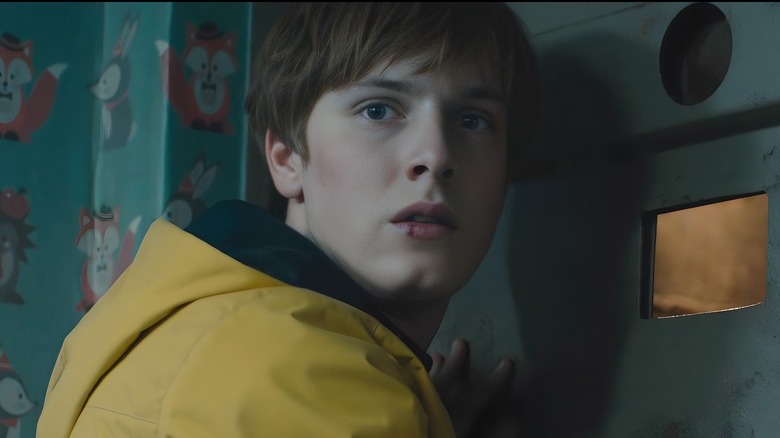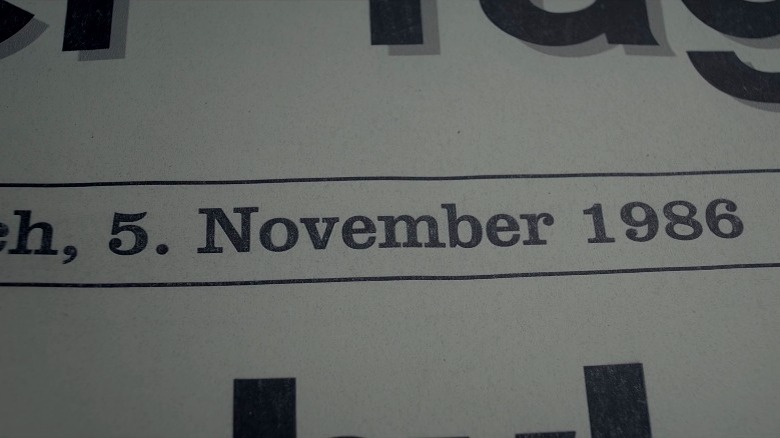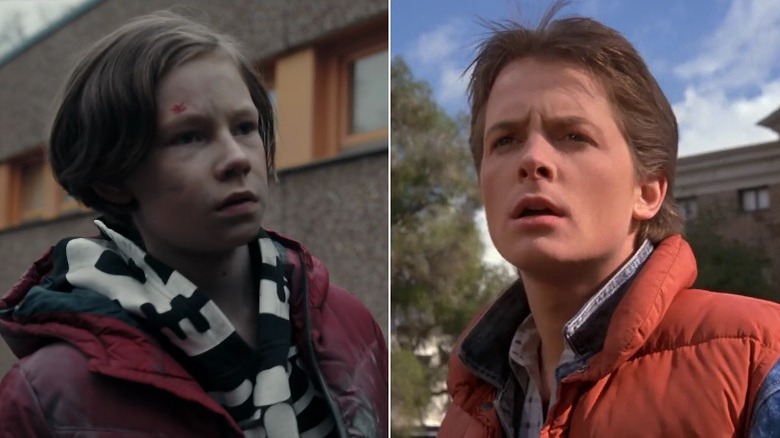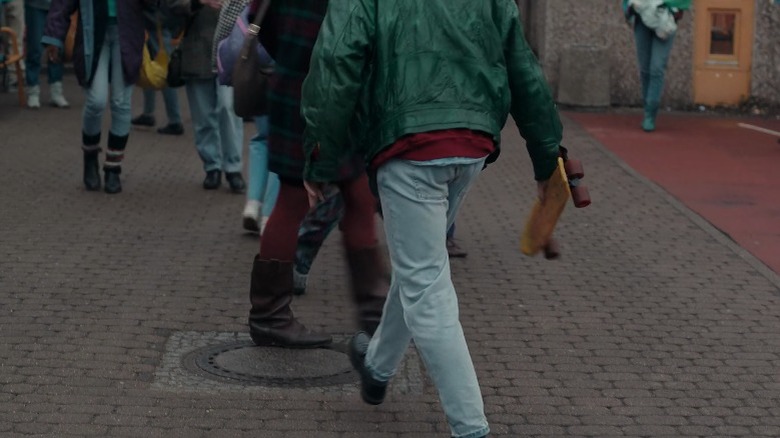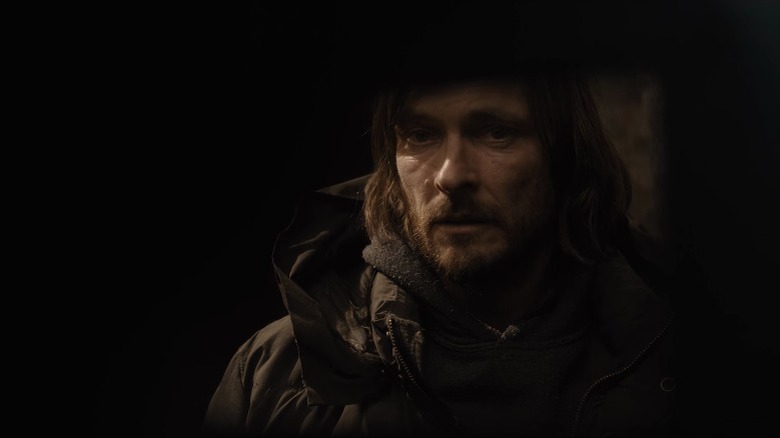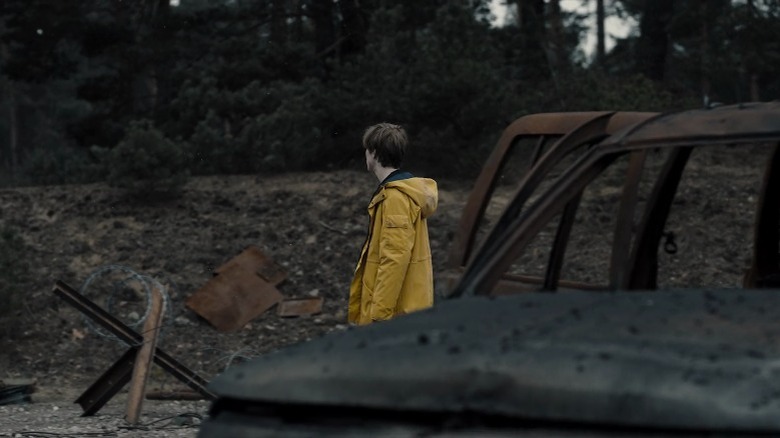Every Back To The Future Reference In Netflix's Dark According To Reddit
Time travel has always been an evergreen theme in science fiction, and one of the most influential time travel tales, of course, is the "Back to the Future" movie trilogy, which has remained for decades as a textbook model of pop entertainment centered around the implications of interacting with past and future worlds. In recent years, meanwhile, one of the most popular pieces of time travel-themed sci-fi media has been a German TV series: The Baran bo Odar and Jantje Friese-created "Dark," which gained a massive fan following around the world thanks to its distribution via Netflix.
Even though "Dark" is — ahem — a darker, more tragic, more existential time travel story, the overlap between fans of "Back to the Future" and fans of "Dark" is significant, and the Netflix show has never played coy about the classic Robert Zemeckis films' influence. For starters, both series are keenly focused on calendar dates and their plot significance, and November 12 is a particularly pivotal date for the characters of both worlds: It's the day in 1955 in which Marty McFly (Michael J. Fox) finally manages to travel back to 1985, and also the date of the events that unfold on the Season 1 finale of "Dark" across the 1953, 1986, and 2019 timelines. But the references to "Back to the Future" in "Dark" do not stop there; as a matter of fact, fans on Reddit have been able to spot several more.
November 12 is not the only crucial date shared by both works
Note: Spoilers for "Dark" and the "Back to the Future" trilogy abound from here on out
On January 26, 2018, a post titled "Back to the Future references" was made on the r/DarK subreddit by user u/Wesk89. The post, which was made back when only the first season of "Dark" had come out, pointed out several references to "Back to the Future" on the show — the first one of which echoes the fact that "Dark" takes after the films' emphasis on November 12 as a crucial date.
The poster noted that November 5, 1955, is the date to which Marty McFly originally travels in "Back to the Future," due to being the day on which Emmett "Doc" Brown (Christopher Lloyd) originally conceived of time travel by slipping on his toilet, hitting his head on the sink, and getting the idea for his flux capacitor. This is relevant when looking at "Dark," and almost certainly a deliberate reference, because November 5 is also an important date that recurs through the plots of the show's 1953, 1986, and 2019 timelines.
It is on November 5, 1953, that Erik Obendorf's (Paul Radom) body is transported right before being carried to the nuclear plant in Winden; November 5, 1986, is also the day to which Erik is originally transported from 2019, and the one on which Mikkel Nielsen (Daan Lennard Liebrenz) wakes up in the cave — all of which is concurrent with the discovery of Mads Nielsen's (Valentin Oppermann) body and the arrival of adult Jonas Kahnwald (Andreas Pietschmann) from the future on November 5, 2019.
Mikkel's demeanor and clothing are reminiscent of Marty's
User u/Wesk89 also noted similarities between the depiction of Mikkel Nielsen on "Dark" and the portrayal of Marty McFly in the "Back to the Future" films, which makes a lot of sense given that Mikkel is the first character through whose eyes we witness the experience of traveling to the past on the Netflix show. The poster wrote, "The way Mikkel walks when he arrives at the school is very reminiscent of Marty whenever he arrives in Hill Valley after time-travelling and the camera pans up."
This description refers to the fact that "Dark" and "Back to the Future" both feature the characters in question stumbling confusedly through a mundane everyday shuffle upon arriving at the past version of their towns. Mikkel's hesitant walk up to the high school entrance in 1986 in "Dark" Season 1, Episode 3, "Past and Present," pointedly echoes the way Marty soaks in the year 1955 as he walks around Hill Valley in "Back to the Future."
Additionally, the original poster also noticed what seems like an intentional similarity between the red jacket Mikkel is wearing upon arriving to 1986, and the red puffer vest that Marty wears throughout the majority of "Back to the Future." When you take into account that the puffer vest in question became iconic enough that Marty's jacket in "Back to the Future Part II" even emulates its look, it's very possible that that was in fact a deliberate nod on the part of "Dark" costume designer Anette Guther.
Dark features a very familiar skateboard flip
There's something fun about the parallels between "Dark" and "Back to the Future." Due to the temporal distance between both works and the fact that they work off of relatively similar time travel intervals, the present of "Back to the Future" is the past of "Dark," while the latter's present is the former's future, with the 1950s serving as an even further regression on the German series. Therefore, while "Back to the Future" presents Marty McFly's passion for skateboarding as not only a key character trait but an unmistakable, deeply identifiable marker of his contemporary mindset, "Dark" flips skateboarding on its head as a signifier of the past.
This becomes evident in a shot that also occurs during Mikkel's baffled walk around 1986 Winden on "Dark" Season 1, Episode 3, which was noted by Redditor u/Heisenberg_B_Damned on the aforementioned thread. Before we even see Mikkel approaching the high school, we see what he's seeing — specifically, a teenage boy in a stylish green jacket using his foot to effortlessly flip a skateboard into his hand, as the camera tilts up from a low close-up of the board. This, of course, is exactly what we see in "Back to the Future" when Marty needs to carry his skateboard around — the clean effortlessness of the trick and all. Again, it seems like a very conscious visual reference, but with a clever twist: Instead of familiar, the image of skateboarding as a must-have cool teen skill is framed as alien and distancing.
The Back to the Future lore is directly mentioned by the characters
Like any fresh take on an old sci-fi or fantasy idea that takes place in a "grounded" world, "Dark" is a show over which an unspoken question hangs: Is the character's understanding of what's happening informed by preexisting media to the same extent as ours? And, while the majority of the series avoids direct mention of other time travel-themed films and TV series, there is a moment toward the end of Season 1 that confirms the "Back to the Future" films exist within the show's universe.
This was noticed by original poster u/Wesk89 on the Reddit thread, who wrote, "'Stranger' mentions the DeLorean when talking to Jonas. Obviously." This refers to the scene in the Season 1 finale, "Alpha and Omega," in which Jonas Kahnwald (Louis Hofmann) wakes up in the bunker in the 1986 timeline, and is given an explanation by the Stranger — who has not yet been revealed as his own future self — about the fact that he will be used as a test subject for a time machine prototype. After explaining that the passage in the cave is right under the bunker and that the energy will therefore flow through the bunker if the passage is opened, the "Stranger" says, "No DeLorean. No hissing or steam. The first time machine is a bunker with four walls." Sadly, that dry little pop culture reference does little to alleviate teenage Jonas' desperation.
Despite the references, Dark's take on time travel is very different
The irony of "Dark" Season 1 containing so many seeming references to "Back to the Future" was not lost on Reddit fans. The most-liked comment on the thread, by u/Tabbender, argued, "Pretty ironic that this series makes so many Back to the Future reference [sic] when time travel in Dark works pretty much the reverse of how it does in BTTF."
Indeed, a major difference between "Dark" and "Back to the Future" is that the former adheres to the Novikov self-consistency principle, while the latter pointedly does not. Developed by Russian physicist Igor Dmitriyevich Novikov, the principle posits that the timeline of a world with the possibility of time travel is already fixed, and any attempts to change the past would ultimately just fall into the exact circumstances that travelers might be attempting to change.
"Dark" takes that theoretical immutability of time and fate as its primary dramatic theme. "Back to the Future," meanwhile, is more lax in its vision of time travel like most stories that don't follow the principle, depicting the world as changeable based on what's altered in the past. Yet sometimes, it suggests that the circumstances of a future point in time have already been set in motion by the characters' visit to the past even before said visit occurs. Chalk it up to the difference between a dense, existential hard sci-fi drama and a crowd-pleasing action-adventure blockbuster — not that either work is any less great than the other for that, mind you.
